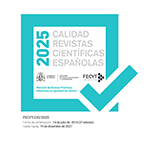Variation in embodied metaphors: A contrastive analysis of taste metaphors in Spanish and English
Abstract
Whereas in the late 90s the universal character of many embodied conceptual metaphors was overemphasised, in the last years some authors have claimed that culture plays a crucial role in the motivation of all kinds of conceptual metaphors, including those grounded on universal bodily experiences. In order to shed some light on this issue, we carry out a contrastive analysis of conceptual metaphors with basic tastes as a source domain in Spanish and in English. To this end, we employ a mixed approach, combining data from dictionaries and linguistic corpora. Our analysis reveals that variation is higher at the level of linguistic expression and lower, but still significant, at the conceptual level. Although most taste metaphors are shared by Spanish and English, a few language-specific conceptual metaphors are also found, proving that food culture has an influence on the motivation of conceptual metaphors.
Downloads
Article download
License
In order to support the global exchange of knowledge, the journal Complutense Journal of English Studies is allowing unrestricted access to its content as from its publication in this electronic edition, and as such it is an open-access journal. The originals published in this journal are the property of the Complutense University of Madrid and any reproduction thereof in full or in part must cite the source. All content is distributed under a Creative Commons Attribution 4.0 use and distribution licence (CC BY 4.0). This circumstance must be expressly stated in these terms where necessary. You can view the summary and the complete legal text of the licence.









